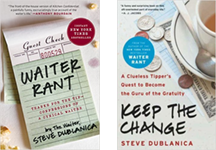“Hi,” the man said, extending his hand. “My name is Robert. But you can call me Bob.”
“Hi Bob,” I said, taking the man’s hand. “My name’s Stephen.”
“You’re the new couple’s son.”
“That’s right.”
“How are they fitting in?”
“So far, so good.”
“I got here two months ago myself,” Bob said.
“How do you like it?”
“The food’s good, the staff are nice. No complaints.”
Last month my parents moved into an assisted living facility twenty minutes from my house, and I’ve settled into a routine of visiting them twice a week. As with any child with a parent in a nursing facility, the purpose of my visits is two-fold; to see my folks and let the staff know I’m watching them. So far, everyone is doing what they’re supposed to do, and my parents seem content.
“Seems like a well-run place,’ I said. Bob nodded.
I figured Bob to be in his late eighties and, as we sat in the lounge, an old movie was playing at high volume on the large screen television – Sabrina.
“Good movie,” I said. “Bogart. Hepburn.”
“A classic. They don’t make movies like these anymore.”
I figured Bob was a teenager when the movie came out in 1954 and that was the reason it was playing; reminding him and the other’s watching of when they were young. In fact, the facility is filled with nostalgic kitsch; like the artwork lining the hallways featuring the cast of television shows from the 60’s, 70’s and 80’s – The Jeffersons, Gilligan’s Island, Maude, and, of course, The Golden Girls. Historical personages make appearances too. Next to my parent’s room is a picture of Queen Elizabeth when she was in her twenties. If I end up in a place like this, what pictures will I be looking at in twenty-five years? Probably posters from Star Wars, Raiders of the Lost Ark, album covers from U2 and Madonna and a pic of Ronald Reagan.
“My wife died in April,” Bob said. “We’d been married sixty years.”
“I’m very sorry.”
Bob shrugged. “You married?”
“Ten years,” I said. “One child. She’s nine.”
“Oh yeah,” Bob said. “The little girl. I saw her once. She’s yours?”
“Yes.”
“Very cute.”
“Thank you. Do you have children?’
“Three sons,” Bob said. “They visit me all the time.”
I stole a glance at my watch. My mom was in physical therapy and due to emerge soon. Then Bob dropped a bomb.
“Yep,” he said. “Now I’m just waiting to die.”
I didn’t react because I’d heard that sentiment expressed before. When I visited sick people as a young seminarian, I heard it all the time. Being young with my whole life ahead of me, I found that upsetting at first but, after a while, learned to listen without judgment. Everyone’s life takes its own course and there’s no way to truly know what any one person has endured. Since there was nothing to say, I sat with Bob and watched the movie as I waited from my mom to complete her therapy. Then Bob said, “You some kind of minister or something?”
“No,” I said, smiling. “Why do you think that?”
“I dunno. You look like one.”
“I guess I have that kind of face.”
About ten years after I graduated, I ran into a former classmate who’d been kicked out of the seminary because, in addition to lackluster academic performance, was a bit odd. “I still want to be a priest,” he told me, and then recounted how he’d spent the intervening decade going from diocese to diocese and religious order to religious order trying to get accepted as a candidate. No one would take him. “I’m going to apply to a diocese in Portugal next,” he told me. “Maybe they’ll take me.” After we parted, I felt sorry for him, wondering why he was desperately chasing a vocation that would be forever out of his reach. But I knew why.
According to Catholic theology, when a man is ordained to the priesthood, God places an indelible mark on his soul and, as the theology goes, everyone in the afterlife will know he is a priest. That might work in your favor if you go to Heaven but, if you end up in hell, it’s probably a target on your back. (Sort of like a cop going prison – and your cellmate Beelzebubba is gonna be very interested in you.) This all sounds ridiculous I know, and I used to think this mystical seal of approval business was all self-serving hocus pocus mumbo jumbo cooked up by the clerical class to make them feel better about themselves – that they were special. “Many are called,” I’ve heard a few self-satisfied ordinands say, “But few are chosen.” If that’s true, some very bad choices have been made. So, I cast God writing on men’s souls in invisible ink into the dustbin with a host of other other Catholic oddities after I left the church. Then I became a father.
We have all heard parents say, “Unless you have children, you’ll never understand.” When I was childless, I thought that was also nonsense. There are tons of people out there who don’t have children that are wonderful with kids and know what makes them tick. Lewis Carroll, for instance, never sired offspring and yet wrote one of the most magical pieces of children’s literature ever. But, after I had my daughter, I realized that axiom was very true. When I watched my daughter being born, I realized I was forever changed – because becoming a parent places an indelible mark on your soul too. It doesn’t make you special or better than those who don’t have kids, but on a deep emotional level, you now know something they just don’t. Even if you abandon your child and try to forget all about them – or God forbid, lose them – you can never escape the fact you are a mom or dad. The mark is eternal.
But birth isn’t the moment you become a parent. It’s a process that happens slowly and in stages; the shock of finding out a baby is on its way, hearing its heartbeat for the first time, posting ultrasound pictures of its fishlike body on Instagram, the rigors of pregnancy, the gender reveal, picking out cribs, clothes, painting the nursery, having that bag packed, discussing names and, in those moments of anxiety, wondering what you’ll do if something goes wrong. So, for most people, when that child emerges from the womb, the baby is the visible sign you’re a parent; but you’ve already been wearing the mantle of mom or dad for a while. Of course, it’s also a process that never ends.
The same thing happens when you get married. Marriage is society’s recognition of a deep spiritual and psychological process that occurs between two people so, by the time you’re standing at that altar, you should already be man and wife – or husband and husband, etc. When Annie was still just a girlfriend and moved her stuff into my place, I told my mother, “If we can survive this, we’ll probably get married.” And, in the intervening year and a half until we exchanged vows, life was a series of negotiations, arguments, reconciliations, and intimacies that prepared us to make a lifetime commitment. We were already joined at the hip when we said “I do” and, even if we got divorced, widowed or I went out for a pack of smokes and never returned, the fact that we had been married would also be an indelible and eternal mark. I mean, how many women keep their married name after they start collecting alimony?
When a man is ordained to the priesthood, the imposition of the bishop’s hands isn’t some magical ritual that suddenly imbues the ordinand with sacerdotal superpowers. Like marriage and parenthood, getting ordained is also the culmination of a long process of study, discernment, internal arguments, and negotiations. I once heard a bishop say, “If a man isn’t already a priest by the time he’s ordained, he’ll probably never become one.” The ceremony, while canonically necessary and important, is just the visible sign to society of your promise to God, though like marriage and parenthood, keeping that promise is a lifetime process too. All this brings me to the point I’m ineleganlty trying to make – while I was never ordained, I engaged in that process of discernment as well, so it’s not far fetched to think that some of that divine invisible ink also spilled onto me.
So, I wasn’t surprised that my sad old classmate couldn’t let go of his vocation. Another of my classmates left to get married and become a cop yet, when I run into people who knew him during his thirty years in law enforcement, they always say, “Yeah. Tommy studied to be a priest once.” Even after almost forty years, his former vocation is one of the most defining aspects about him. Like me, Tommy was burned with that indelible sign too. Now, I have absolutely no desire to become a priest and those days of wondering, “What if?” are long gone. (Though when my wife and I argue, I often ask her if the monastery is still hiring.) But I’m no long surprised when people mistake me for a minister. I have that kind of face because, whether I like it or not, God has written seminary into the story of my soul.
That might also explain while some priests are uncomfortable around me when they learn I’m a former seminarian. Since I bowed out early, I can’t imagine what a lifetime in ministry is like but, because I share some of the same experiences – bear some of the same mark – they sometimes become wary, knowing that I’ve taken a long hard stare at what’s behind the ecclesiastical curtain. On the occasions when I’ve contentiously debated them about where the Church is headed, some of them glibly wrote me off as a “bitter ex-seminarian.” “I stayed,” one told me. “You left. What do you know?” That’s true of course, but when I encounter such defensiveness, I can’t help but figure that man’s wondering what his life would have been like if he had made the same choice I made. But all of us bear marks.
No one becomes a person by themselves. We are as other people make us. And all those encounters, whether good or bad, indelibly mark our souls too. Sometimes we understand how friends, family, enemies, lovers, and strangers have affected us, but often they leave no obvious trace – like their tale was written in that damn invisible ink. The reason we can never truly know what any one person has endured is because much of their story is unreadable. Heck, we’re often mysteries to ourselves. But I like think that when we die and are exposed to blazing light of God’s merciful love, all that invisible script will suddenly be revealed. We will know everyone’s story and they will know ours and, in this revelation, true justice and forgiveness will finally be possible. Hopefully, all the indelible marks I bear – seminarian, writer, husband, son, brother, father, and friend – will hold me in good stead when I meet St. Peter. But even if they don’t, I have faith God’s still got a good ending written for me. Or at least like to think so.
I’d hate to find Beezlebubba waiting to stick a shiv in me.


You’re such a beast, man